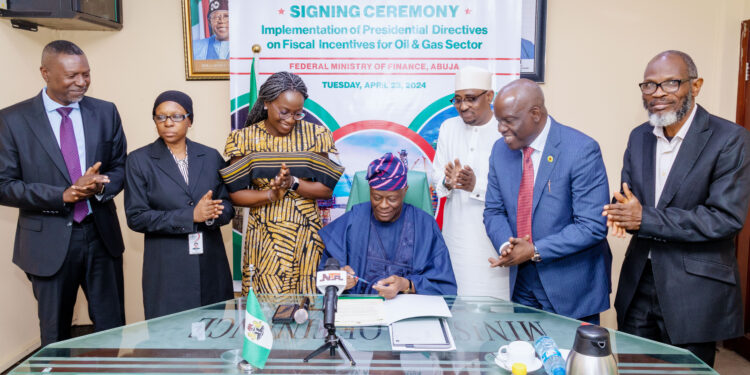….Targets $10Bn Foreign Direct Investment
The Minister of Finance and Coordinating Minister of the Economy, Mr. Wale Edun, has signed the Consolidated Guidelines for the implementation of Fiscal Incentives for the Oil & Gas Sector – a key component of the Federal Government’s fiscal reforms agenda aimed at enhancing the performance of the oil and gas sector and contributions to the nation’s economic growth.
During the signing ceremony, the Special Adviser to the President on Energy, Mrs. Olu Verheijen, who coordinated the event, said the initiative was to ensure a competitive framework for the Nigerian oil and gas industry.
According to her, the consolidated guidelines for the fiscal incentives are based on extensive collaboration between the ministries of Finance and Petroleum Resources as well as several key regulatory agencies, including the Federal Inland Revenue Service (FIRS), the Nigerian Upstream Petroleum Regulatory Commission (NUPRC), and the Nigerian Midstream and Downstream Petroleum Regulatory Authority (NMDPRA).
Verheijen pointed out that the new fiscal measures were designed to deliver a competitive Internal Rate of Return (IRR) for oil and gas projects and attract over $10 billion in new investments within the next 12-18 months.
She maintained that they also underscored Nigeria’s commitment to achieving her long-term oil production target of 4 million barrels per day whilst enhancing the reliability of gas supply for to boost export earnings and fuel Nigeria’s industrialization.
Verheijen disclosed that among the guidelines signed at the forum including the NUPRC Guidelines on Hydrocarbon Liquids Content in a Non-Associated Gas (NAG) Field, essential for accurately categorising and quantifying the hydrocarbon liquid content in these fields.
The President’s aide explained that additional guidelines focused on the applicability of tax credits and allowances for Non-Associated Gas Greenfield Development and the Midstream Capital and Gas Utilization Allowance, providing taxpayers with clarity on the computation of these benefits.
In his remarks, the minister thanked President Bola Tinubu for signing the directive in February 2024 to engender growth in the Nigerian oil and gas sector in view of the potential in growing the sector.
Edun said: “The idea is to create an atmosphere conducive to international competitiveness such that investment comes in. And in this case, we know its foreign direct investment”.
The signing ceremony was attended by various stakeholders, including NNPC Limited, Oil Producers Trade Section (OPTS) and the Independent Petroleum Producers Group (IPPG), further highlighting Nigeria’s unified approach toward reinvigorating its oil and gas sector.






